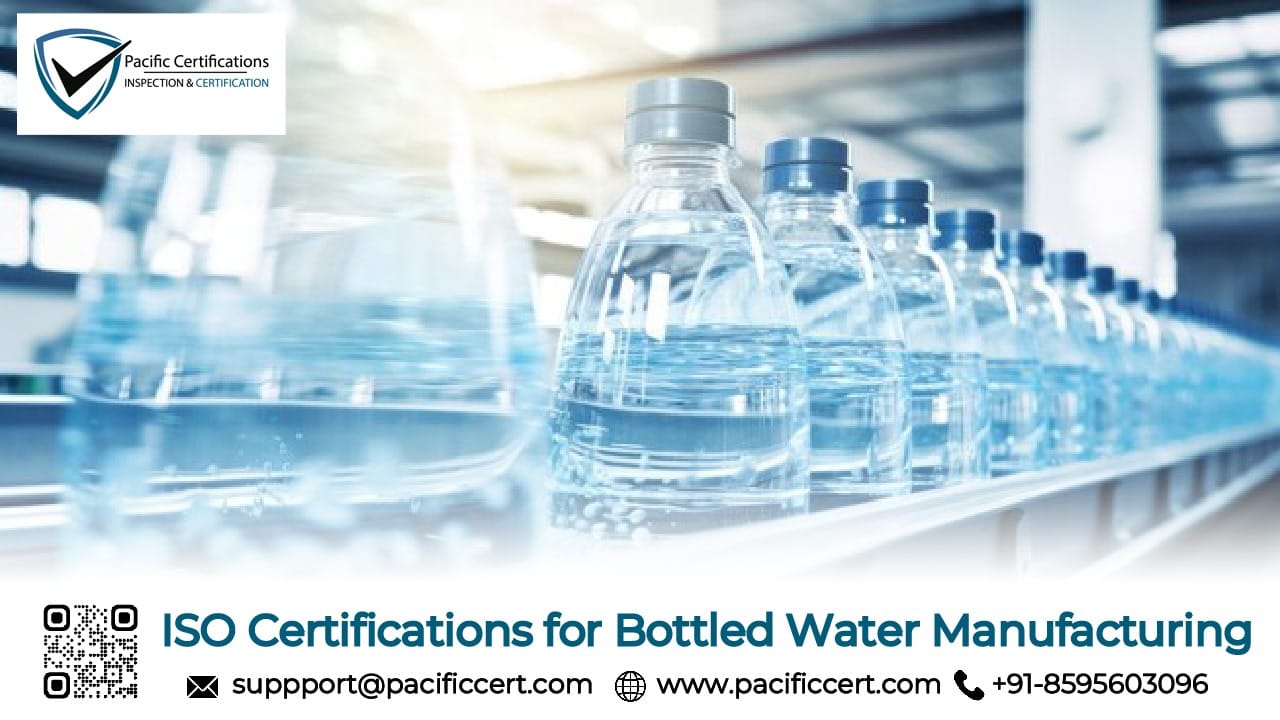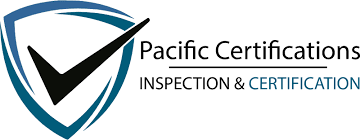ISO Certifications for Bottled Water Manufacturing Businesses, Requirements and Benefits

Quick Summary
ISO certifications help bottled water manufacturers deliver safe, high-quality, and sustainable products. Key standards include ISO 22000 (food safety), HACCP (contamination control), ISO 9001 (quality), and ISO 14001 (environment). Certification reduces risks and builds consumer trust in an industry where safety and sustainability are top priorities.
ISO Certifications for Bottled Water Manufacturing Units
The bottled water industry is a fast growing sector in the global beverage market. Rising concerns over safe drinking water and consumer demand for healthy alternatives to soft drinks are fueling growth. The market is projected to exceed USD 500 billion by 2030, with Asia, North America, and Europe leading consumption.
Despite its rapid expansion, the industry faces critical challenges. Health and safety risks, and environmental concerns over plastic waste and water sourcing have created pressure on companies to adopt internationally recognized standards. ISO certifications provide bottled water manufacturers with systems that safeguard product quality and align operations with sustainability goals and legal requirements.
For bottled water manufacturers, ISO certifications provide the assurance of safety, quality, and compliance that consumers and regulators expect.
If you're looking for ISO certification for bottled water manufacturing, contact us at [email protected] to start your certification process!
Applicable ISO Standards for Bottled Water Manufacturing
Several ISO certifications directly impact bottled water manufacturing. Below is a breakdown of the key standards relevant to this industry:
Standard | Focus Area | Relevance |
|---|---|---|
ISO 9001:2015 | Quality Management | Ensures consistent product quality and customer satisfaction. |
ISO 22000:2018 | Food Safety Management | Controls hazards in the water bottling and packaging process. |
HACCP | Hazard Analysis & Critical Control Points | Prevents contamination and ensures safe water processing. |
ISO 14001:2015 | Environmental Management | Manages water usage, plastic waste, and ecological impact. |
ISO 45001:2018 | Health & Safety | Protects workers in plants where chemicals and machinery are used. |
ISO 50001:2018 | Energy Management | Reduces energy costs in water treatment and bottling facilities. |
ISO/IEC 27001:2022 | Information Security | Secures customer data, supply chain records, and digital platforms. |
ISO 22301:2019 | Business Continuity | Ensures uninterrupted operations during disruptions. |
ISO 22000: Food Safety Management System (FSMS)
ISO 22000 sets out the requirements for an effective food safety management system, ensuring that all food-related hazards are controlled at every stage of the production chain. For bottled water producers, this certification covers everything from water treatment to bottling and packaging.
ISO 9001: Quality Management System (QMS)
ISO 9001 focuses on the overall quality management of an organization. This certification ensures bottled water manufacturers maintain consistent product quality and continuously improve processes to meet customer expectations.
ISO 14001: Environmental Management System (EMS)
Given the importance of sustainable practices, ISO 14001 helps companies reduce their environmental footprint. It ensures efficient use of resources and proper waste management throughout the bottled water production process.
ISO 45001: Occupational Health and Safety Management System (OH&S)
This standard focuses on worker safety, helping bottled water manufacturers create a safe working environment. Compliance with ISO 45001 reduces risks of accidents and ensures employee well-being.
ISO 17025: Testing and Calibration Laboratories
Water testing is a critical part of bottled water manufacturing. ISO 17025 ensures the competence and accuracy of laboratories performing tests, ensuring that the water meets required safety and quality standards.
ISO 26000: Social Responsibility Guidelines
While ISO 26000 is not a certifiable standard, it provides guidelines for companies aiming to enhance their social responsibility. Bottled water companies adopting these principles can improve stakeholder trust and align with sustainable business practices.
Click here to find out more applicable standards to your industry
How Pacific Certifications can help?
At Pacific Certifications, we provide certification and auditing services for ISO standards in the bottled water industry. Our audits support manufacturers in building reliable systems for safety, quality, and sustainability, ensuring compliance with both local and international requirements.
With Pacific Certifications, your business can:
- Obtain certification for ISO 22000, HACCP, ISO 9001, ISO 14001, ISO 45001, and more.
- Strengthen compliance with health and environmental regulations.
- Build consumer trust with accredited certification.
- Expand into global markets where certified suppliers are preferred.
Contact us at [email protected] for more information!
Manufacturers must set up structured systems for quality, food safety, and sustainability, supported by clear policies and documentation. Here’s an overview of key requirements:
General requirements of ISO Certifications for Bottled Water Manufacturing:
- Define the scope of operations covering water sourcing, purification, bottling, and distribution.
- Establish policies for food safety, quality, environmental responsibility, and occupational safety.
- Conduct hazard and risk assessments for contamination, packaging, and supply chain failures.
- Document procedures for purification, quality testing, cleaning schedules, and packaging control.
- Train employees in food safety, hygiene, machine safety, and emergency response.
- Keep detailed records of testing, supplier checks, audits, and corrective actions.
- Monitor performance through KPIs such as microbiological results, customer complaints, and production efficiency.
- Run internal audits and management reviews to verify compliance and improvements.
Specific requirements of ISO Certifications for Bottled Water Manufacturing:
ISO 22000 Requirements
- Implementation of a Hazard Analysis and Critical Control Points (HACCP) system to identify potential food safety risks.
- Monitoring and documenting every step of the production process to ensure traceability.
- Regular water quality tests and microbiological analysis.
- Employee training on hygiene practices and handling procedures.
ISO 9001 Requirements
- Establishing quality objectives and regularly reviewing their achievement.
- Consistent product monitoring through audits and inspections.
- Customer feedback mechanisms to ensure continuous improvement.
ISO 14001 Requirements
- Identification and reduction of environmental impacts in manufacturing.
- Use of eco-friendly materials and sustainable packaging.
- Effective wastewater treatment and recycling measures.
ISO 45001 Requirements
- Conducting risk assessments to prevent accidents and injuries.
- Establishing safety protocols and training employees.
- Routine monitoring and improvement of workplace safety standards.
Tip: ISO 22000 combined with HACCP provides the foundation for food safety, while ISO 9001 strengthens quality systems and ISO 14001 addresses sustainability challenges.
What are the benefits of ISO Certifications for Bottled Water Manufacturing?
Certification improves credibility, enhances safety, and opens access to larger markets. Below are the key benefits:
- Assurance of product safety and compliance with food safety regulations.
- Stronger consumer confidence through certified quality and hygiene standards.
- Reduced risk of contamination or recalls due to preventive controls.
- Sustainable operations by minimizing water waste and improving recycling practices.
- Safer working conditions across manufacturing and bottling lines.
- Access to international markets where ISO certifications are a prerequisite.
- Better preparedness for crises such as supply disruptions or product recalls.
- Improved efficiency through structured quality and monitoring systems.
Market Trends
The bottled water industry is expected to maintain strong growth, with demand driven by health-conscious consumers and rising distrust in municipal water supplies. Premium and functional water segments, such as vitamin-enriched and electrolyte-infused water are expanding rapidly.
Sustainability remains a major trend. Regulations on plastic packaging are tightening worldwide, with countries mandating recycled content and encouraging refillable systems. This makes ISO 14001 highly relevant. Companies are also investing in energy-efficient bottling plants and smart monitoring systems, making ISO 50001 critical. At the same time, food safety regulations are stricter than ever, with governments requiring traceability and HACCP systems.
With these developments, achieving ISO certification is no longer optional but a strategic necessity for bottled water manufacturers aiming for long-term success.
Pacific Certifications is accredited by ABIS, in case you need support with ISO certification for your Bottled Water Manufacturing business, please contact us at [email protected] or +91-8595603096.
Ready to get ISO certified?
Contact Pacific Certifications to begin your certification journey today!
Author: Sony
Suggested Certifications:
Read more: Pacific Blogs

